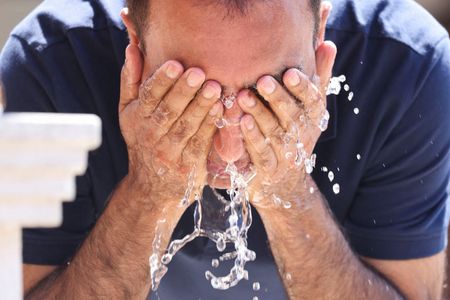By Sergiy Voloshyn and Valentyn Ogirenko
VINNYTSIA, Ukraine, July 15 (Reuters) A Ukrainian city far from the frontline grieved its dead including a 4-year-old girl with Down’s Syndrome on Friday, a day after a Russian missile attack killed at least 23 people and wounded scores.
Ukraine said Thursday’s strike on an office building in Vinnytsia, a city of 370,000 people about 200 km (125 miles) southwest of Kyiv, had been carried out with Kalibr cruise missiles launched from a Russian submarine in the Black Sea.
The missiles destroyed a nearby medical center and some people arriving for treatment were burnt alive in their cars outside, the owner of the center said. Two doctors were severely wounded.
The attack was the latest in a series of Russian hits in recent weeks using long-range missiles on crowded buildings in cities far from the front, each killing dozens of people.
Residents placed teddy bears and flowers at a makeshift memorial.
Among the dead was Liza, a 4-year-old girl with Down’s Syndrome, found in the debris next to a pram. Images of her pushing the same pram, posted by her mother on a blog less than two hours before the attack, quickly went viral.
Her severely injured mother, Iryna Dmitrieva, was being kept in an information blackout at a hospital for fear that finding out about her daughter would kill her, doctors said.
“She is suffering from burns, chest injuries, abdominal injuries, liver and spleen injuries. We have stitched the organs together, the bones were crushed as if she went through a meat grinder,” Oleksandr Fomin, chief doctor at the Vinnytsia Emergency Hospital, said. Were she told of her daughter’s death, “we would lose her”.
President Volodymyr Zelenskiy’s wife, Olena, tweeted that she recognised the girl, who had once been among a group of disabled children who painted Christmas ornaments with the first lady in a holiday video.
“Look at her, alive, please,” Olena Zelenska wrote.
The building housed an officers’ club, which Russia’s defence ministry said was being used for a meeting between military officials and foreign arms suppliers. It added: “The attack resulted in the elimination of the participants.”
Ukraine said the club functioned as a cultural centre. The building also housed shops, commercial offices and a concert hall, where musicians were rehearsing for a pop concert planned for that night.
A security camera captured debris flying at the moment of the blast, with two cyclists diving for cover before a cloud of dust darkens the sky.
Zelenskiy called Russia a terrorist state, urged more sanctions and said the death toll could rise.
“Unfortunately, this is not the final number,” he said in a video address to an international conference aimed at prosecuting war crimes in Ukraine. His office said 197 people had sought medical treatment.
Authorities in the southern city of Mykolaiv, closer to the frontlines, reported fresh strikes on Friday which wounded at least two people. They released video pictures of firefighters battling the blaze in the rubble.
“This time, they hit Mykolaiv around 7:50 a.m., knowing full well that there were already many people on the streets at that time. Real terrorists!” Mykolaiv mayor Oleksandr Senkevych posted on social media.
GRAIN PROGRESS
Despite the bloodshed, both sides have described progress towards an agreement to lift a blockade restricting the export of Ukrainian grain. Mediator Turkey has said a deal could be signed next week.
Asked if that timeline was realistic, a senior Ukrainian official told Reuters: “We really hope so. We’re hurrying as fast as we can.” The source asked not to be identified.
Russia’s defence ministry said an agreement was close. Russia’s negotiator cautioned that a grains deal will not lead to a resumption of peace talks.
A deal would probably involve inspections of vessels to ensure Ukraine was not bringing in arms, and guarantees from Western countries that Russia’s own food exports are exempt from sanctions.
Moscow welcomed a written clarification by Washington on Thursday that banks, insurers and shippers would not be targeted by sanctions for facilitating shipments of Russian grain and fertilizer.
The war dominated a meeting of G20 finance ministers in Indonesia on Friday. The conflict involving two of the world’s top grain exporters and one of its main oil and gas producers is causing global shortages of food and energy, inflation, financial crisis and, potentially, hunger.
“By starting this war, Russia is solely responsible for negative spillovers to the global economy, particularly higher commodity prices,” U.S. Treasury Secretary Janet Yellen said.
Canadian Finance Minister Chrystia Freeland told Russian officials at the meeting that she held them personally responsible for “war crimes”, a Western official told Reuters.
Russia calls its Feb. 24 intervention a “special military operation” to disarm Ukraine and root out nationalists. Kyiv and its allies call it an attempt to reconquer a country which broke free of Moscow’s rule in 1991.
The stepped-up Russian attacks on cities far from the front come at a time when momentum appears to be shifting after weeks of Russian gains.
Since capturing the eastern industrial cities of Sievierodonetsk and Lysychansk in battles that killed thousands of troops on both sides, Russia has paused. A Ukrainian general said Kyiv had not lost “a single metre” of territory in a week.
Ukraine has meanwhile unleashed new HIMARS rocket systems received from the United States, striking targets deep in Russian-held territory. It appears to have blown up depots of ammunition Moscow relies on for massive artillery barrages.
The first M270 systems that will give Ukraine additional multi-rocket firepower have arrived in the country, Ukraine’s defence minister said on Friday. Russia fired its own multi-launch rocket system at Sloviansk on Friday, the eastern city’s mayor said.
Ukraine says it is preparing a counter-attack in coming weeks to recapture a swath of southern territory near the Black Sea coast.
(Reporting by Reuters bureaux; Writing by Stephen Coates, Peter Graff and Frank Jack Daniel; Editing by Aurora Ellis, Simon Cameron-Moore, Nick Macfie, William Maclean)














